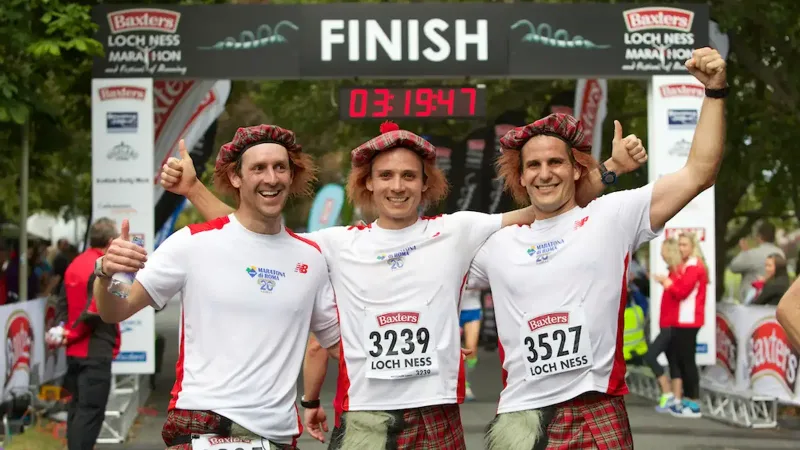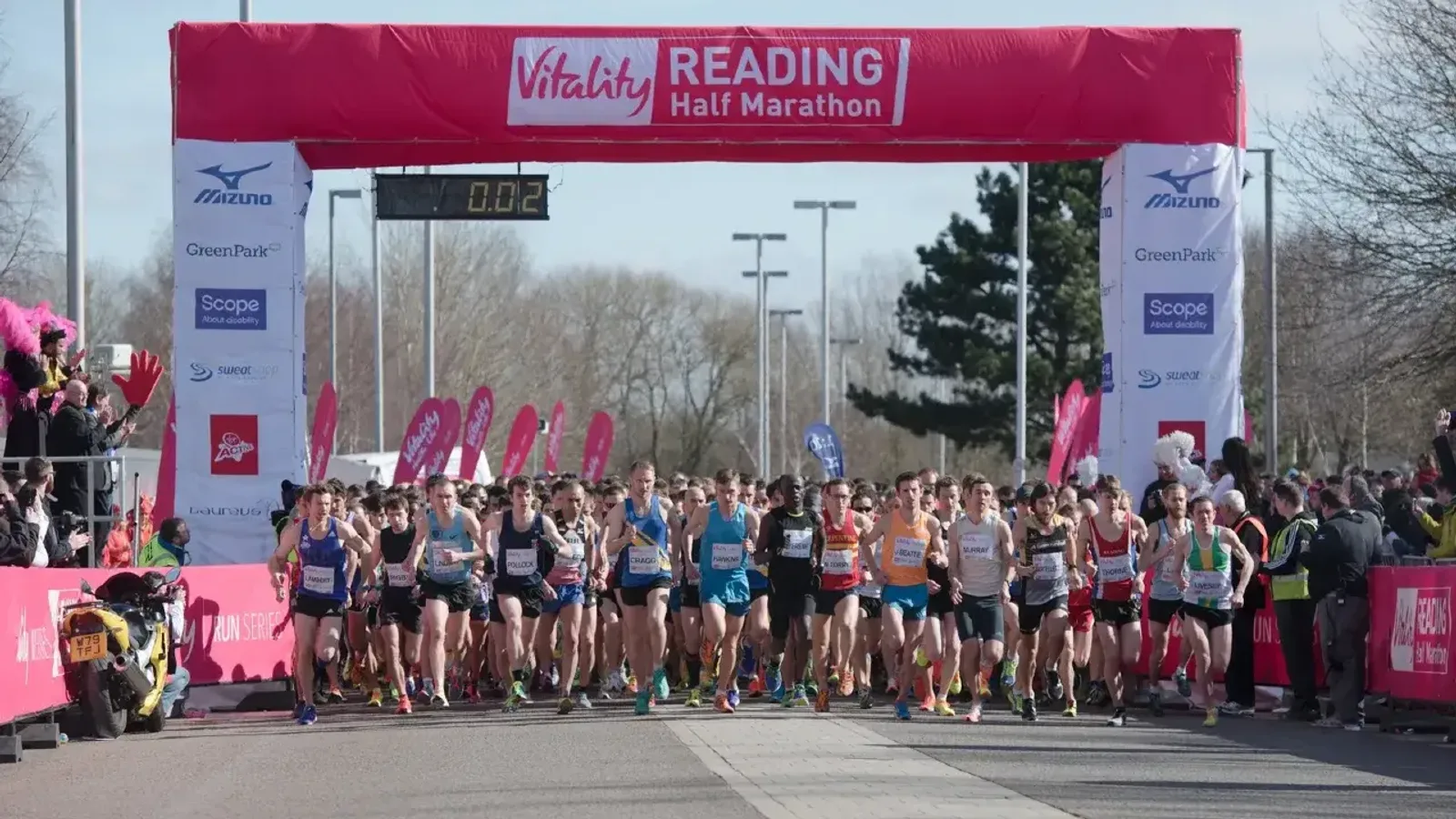What Is a Good Half Marathon Time?
Once you can complete a half marathon run, it's natural that you'll want to push for better times and performances - but what is a good half marathon time to aim for?
Running in a half marathon race requires dedication, commitment, and hard work. Depending on physical fitness and experience levels, every runner has a unique goal and expectation of what they consider a good half marathon time. To help you find a good half marathon completion time goal, we’ll dive into what makes a good half marathon time, how to choose realistic goals, and some tips to help you improve and achieve your desired finish time.
Understanding half marathon times
It goes without saying that half marathon times vary quite a bit from runner to runner. The average finish time for an adult male is around 1 hour and 55 minutes and around 2 hours and 11 minutes for females.
The key factors that will contribute to your finish time include age, fitness level, experience, gender, terrain, altitude, and weather.
Experience is one of the most under-appreciated factors listed above due to the fact that running a half marathon is not only a test of physical endurance, but also a test of mental toughness. Any long-distance running requires a lot of preparation, discipline, and the ability to focus when things get a little tough in those middle miles.
Average half marathon times for different age groups
Age affects the performance and endurance of a runner. Here's a breakdown of the average half marathon times for different age groups:
18-34 years: Males – 1:49:16, Females – 2:07:10
35-44 years: Males – 1:53:27, Females – 2:11:24
45-54 years: Males – 2:02:33, Females – 2:19:47
55-64 years: Males – 2:12:38, Females – 2:29:53
65+ years: Males – 2:21:07, Females – 2:57:27
It is important to note that these times are just averages, and there are always runners who finish faster or slower than the average times.
Which factors impact a half marathon time?
Fitness level is one of the most critical factors. The more fit you are, the faster and more steadily you will be able to run. Running a half marathon is unlikely to ever be easy, but a strong base level of fitness is the cornerstone to a below-average finish time. It is essential to have a well-rounded training plan that includes strength training, endurance training, and speed training.
Experience is another factor that can affect your half marathon time. Think of this more as race day management - not letting nerves get the better of you, not going off too fast and staying focused throughout. The more half marathons you run, the more experience you gain, and the better you become at pacing yourself and managing your energy levels.
Body weight is another factor that can affect your half marathon time. Unfortunately for most of us, the fact the lighter you are, the easier it is to run is inescapable. But this doesn’t mean you should be aiming for dramatic body weight loss prior to a race - maintaining a healthy weight that you are comfortable in is far more important than shaving off pounds in hopes of shaving off minutes as a result.
Nutrition and hydration are also essential factors. Eating a balanced diet and staying hydrated can help you perform better and recover faster. Take a look at our guide on what to eat before a half marathon for some top tips.
Resilience is another factor that can affect your half marathon time. Running a half marathon requires some strength and resilience to help you get past any discomfort or tiredness. Practice is key in improving your resilience, and decisions like choosing to run with music on or not can make a big difference for some runners.
Genetics can also play a role in determining your half marathon time. Some people are naturally better runners than others due to body shape and composition - but with hard work and dedication, anyone can improve their running performance.
Don’t compare your half marathon time against the professionals
Professional runners inspire many people to take up running and participate in marathons. However, comparing yourself to a professional runner isn’t a good benchmark for a good half marathon time. For your sanity and a much better guideline, consider comparing yourself to runners in your age group and fitness level. This will give you a better idea of where you stand and what you need to work on to improve your running performance. If you have runner friends on Strava or at a running group it can be easy to understand roughly how you compare to similar experience and fitness level runners.
How to set realistic half marathon goals
Setting realistic goals is crucial in enabling you to achieve your desired finish time and motivate you throughout your training.
1. Asses your current fitness level
The key to setting realistic goals is to first assess your current fitness level. Being honest with yourself will help you establish a realistic starting point and work your way up gradually without injury.
2. Create a training plan
An effective half marathon training requires a structured plan that accounts for your schedule, endurance level, and goals. A typical half marathon training plan spans 10-12 weeks and incorporates several runs per week, ranging from short, easy runs to long runs, and includes speed and hill workouts.
3. Adjust your goals based on progress
It's crucial to maintain flexibility and adjust your goals based on your progress during your training. You might find you’re absolutely flying or you might have a little setback like injuries or illness preventing you from sticking to the plan perfectly. Remember, achieving your desired finish time is a process that requires patience, commitment, and discipline. Be kind to yourself, celebrate progress, and keep going.
How can I improve my half marathon time?
If you can comfortably run a half marathon but find that your times are quite flat, here are a few top tips to get your PB moving again,
Incorporating speed work into your training regimen can help improve your speed and endurance. Consider doing interval training, tempo runs, and hill sprints.
Keep a good mix of run durations in your training plan. Long runs are an integral part of your half marathon training regimen. They help develop your endurance, simulate race-day conditions, and give you mental toughness and confidence.
Even if you’re a seasoned runner, take the time to check out your form. Proper running form helps improve your efficiency, reduces the risk of injury, and improves your overall performance.
Keep an eye on what you’re fuelling your body with and see what works best for you. Your recovery and nutrition play a significant role in developing your endurance and improving your half marathon time. Ensure you get enough quality sleep, hydrate well, and consume a balanced diet that includes proteins, carbohydrates, and healthy fats.
Developing a race day strategy helps you keep focused, maintain your pace, and achieve your desired finish time.
It's crucial to find ways of staying motivated throughout your training, such as joining a running club, having a training partner or choosing a charity to run for.
Running a half marathon is a superb achievement, and once you’ve conquered one, chasing down personal best times can be quite addictive. Whilst there is no single answer to what makes a good time or how to improve that, the key takeaways here are that you need to set goals that are realistic and be prepared to work on your weaknesses rather than your strengths. Most importantly, try to enjoy the process and just keep going!
Make sure you're ready for race day with our half marathon kit list, or find your next challenge with our half marathon race calendar.
More from the guides

Winter running guide: how to keep running when it’s dark, cold, and you’d rather stay inside
03 Nov 2025
Running through a British winter takes a bit more planning and a lot more persistence than the sun-drenched summer evening jogs. The mornings are dark, the…
Read on
Best Winter Running Events in the UK 2025–26
19 Oct 2025
Looking for winter running motivation? Discover the best UK events for 2025–26, from festive 5K runs and scenic trails to fast half marathons that keep you…
Read on
Fastest 10k races in Scotland – Inverness, Glasgow and beyond
07 Sept 2025
Looking for a quick 10k in Scotland? From the record-breaking River Ness race to Glasgow’s fast park loops and new coastal courses, discover the events that…
Read on
The fastest 10k races in the South West
07 Sept 2025
Explore the fastest 10k races in the South West. From flat seafront routes in Weymouth and Exmouth to the city streets of Southampton and Exeter, find the…
Read on